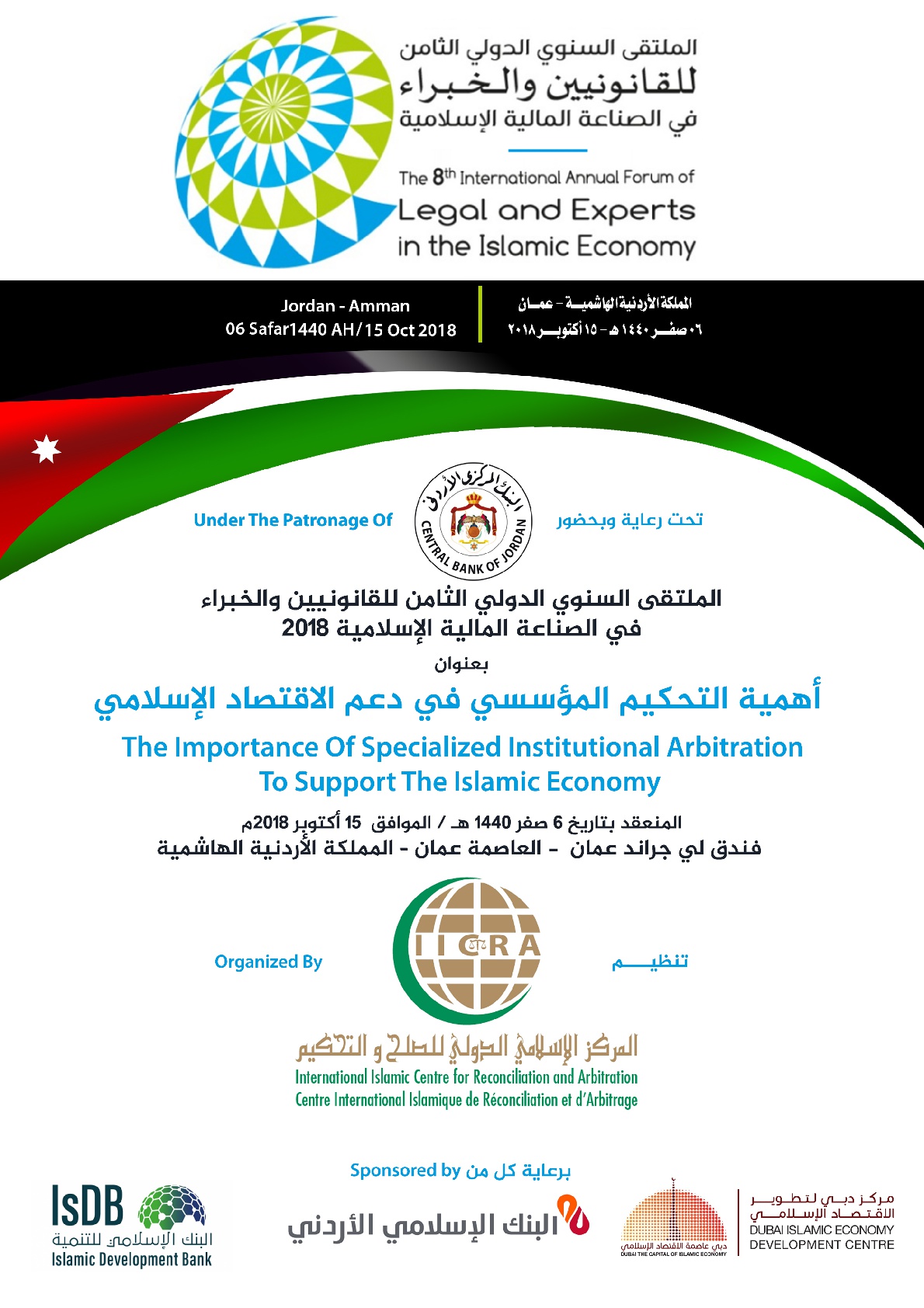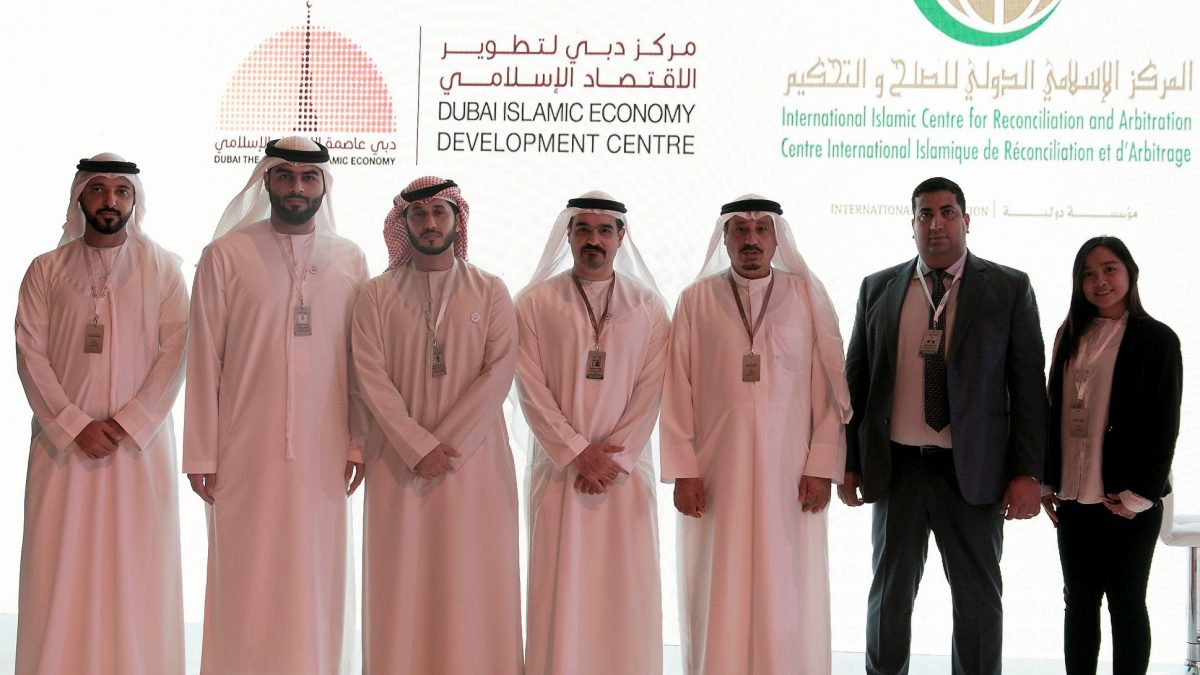
“The 8th International Annual Forum of Legal and Experts in the Islamic Financial Industry 2018”
15/05/2019
IICRA participates in the “Second Arab Capital Markets”
27/05/2019The Promotion of Role of the Islamic Economy is the Key Contributor in Growth, Diversity and Sustainability Locally, Regionally and Internationally
The Dubai Islamic Economy Development Centre and the International Islamic Centre for Reconciliation and Arbitration have signed a Memorandum of Understanding (MoU) on the sidelines of the Global Islamic Economy Summit 2018 held in Dubai based on the keenness of the both institutions to strengthen the professional cooperation in serving the Islamic finance industry in its various aspects, as the goals of the institutions are coordinated to make the Islamic economy a key contributor in the economic growth, diversity and sustainability locally, regionally and internationally.
The signed Memorandum of Understanding has put a frame of reference for the activation of joint cooperation mechanisms between the both institutions aiming to build a constructive partnership that achieves common strategic objectives that aim to expand the scientific and legal culture related to the Islamic financial transactions as well as discussing ways of cooperation in strengthening the Islamic economy sector.
The MoU was signed by His Excellency Abdulla Mohammed Al Awar, Chief Executive Officer of the Dubai Islamic Economy Development Centre, and His Excellency Rami Sulaiman, Chief Executive Officer of the International Islamic Centre for Reconciliation and Arbitration.
“The CEO Abdulla Al Awar of Dubai Islamic Economy Development Centre has confirmed that the Memorandum of Understanding with the International Islamic Centre for Reconciliation and Arbitration comes within the context of keenness to expand the circle of strategic partnerships aiming to spread the culture of the Islamic economy and promoting the Dubai’s position as a global reference for its various sectors. He stated that the expansion and sustained growth of the Islamic economy, which the sectors of the Islamic economy recorded and increased its contribution to the GDP of many countries, makes it necessary to work on the development of innovative ways of reconciliation, arbitration and litigation in the event of disputes. This will highlights the importance of the Memorandum of Understanding that was signed on the sidelines of the Global Islamic Economy Summit 2018”
He added that this momentum in the strategic partners of the DIEDC confirms that cooperation in this field has reached record levels, as all are working in a spirit of one team for the desired goal that is to strengthen Dubai’s position as the capital of the global Islamic economy, which ultimately leads to the development and strengthening of the Islamic Economy System which will benefit the national economy and promote its sustainable growth.
As the International Islamic Centre for Reconciliation and Arbitration standpoint on signing of the Memorandum of Understanding, the CEO Rami Sulaiman said that, the International Islamic Centre for Reconciliation and Arbitration as one of the infrastructure institutions of the Islamic financial industry and its legal arm has always sought to strengthen the bonds of cooperation with those supporting the Islamic economy, such as Dubai Islamic Economy Development Centre that has benefits to the economy in witnessing a rapid growth and must be accompanied by constructive joint action in order to confront challenges and pursue sustainable development approaches. He pointed out that the International Islamic Centre for Reconciliation and Arbitration is witnessing a great demand in terms of the number of institutions where they include the IICRA arbitration clause in its contracts and agreements and at the forefront of these institutions are the large Islamic banking entities locally, regionally and internationally. The International Islamic Centre for Reconciliation and Arbitration also expands its activity to keep abreast to the development of the Islamic financial industry wherever it exists. As this development must be accompanied by an arbitration legal framework that provides a safe haven for resolving banking, financial, commercial, and investment disputes in a manner that does not violate the provisions of Islamic Shari’a by means of reconciliation and institutional arbitration, and in accordance with the best accredited international standards and practices.
It should be acknowledged that the International Islamic Centre for Reconciliation and Arbitration (IICRA) is an international institution specialized in resolving disputes through reconciliation and institutional arbitration. The IICRA was established under an international agreement signed in 2005 in which the efforts of several institutions interested in supporting the Islamic economy, headed by the General Council of Islamic Banks and Financial Institutions, the Islamic Development Bank, and the United Arab Emirates, which hosted the IICRA headquarters in Dubai.
-End-
About the Dubai Islamic Economy Development Centre
The Dubai Islamic Economy Development Centre was established in 2013 under the patronage of His Highness Sheikh Hamdan bin Mohammed bin Rashid Al Maktoum, Crown Prince of Dubai, to support and strengthen Dubai’s position as a global capital for the Islamic economy. In year 2017, the Dubai Islamic Economy Development Centre (DIEDC) has updated its strategy for the next five years, focusing on improving the contribution of the Islamic economy to GDP and setting indicators for the growth of key sectors that is the Islamic financing, Halal industry and Islamic lifestyle. The DIEDC is committed to develop the supporting pillars for the three strategic sectors that is Knowledge, Islamic standards and Islamic digital economy. The DIEDC is keen to cooperate with its local and international strategic partners to establish a strong infrastructure and a comprehensive framework for implementing initiatives that help to promote the rules and principles of the Islamic economy.
Furthermore, the DIEDC is committed to contribute in building a generation of qualified professionals with the necessary skills and capabilities to drive growth across the strategic sectors of the Islamic economy and to participate in achieving sustainable and inclusive development.


